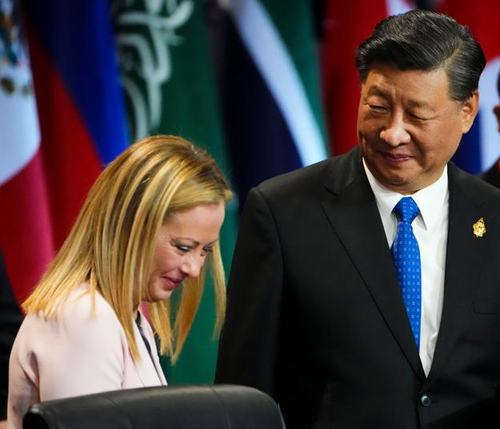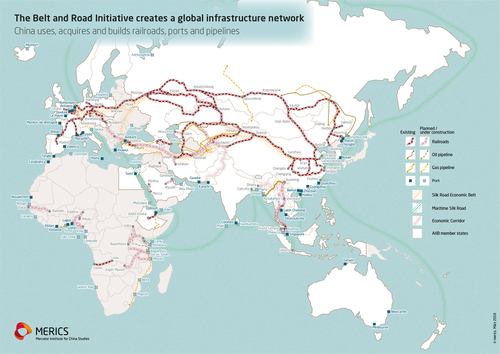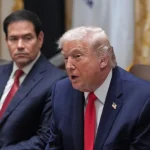
Italy's firebrand conservative prime minister Giorgia Meloni is not playing ball with China, throwing a wrench into President Xi Jinping’s efforts to peel a handful of European Union countries away from US policy.
Bloomberg days ago reported that "Meloni, the right-wing leader who came to power less than a year ago, is leaning toward pulling out of an agreement to join China’s controversial Belt and Road Initiative, which has funded US$900 billion in infrastructure projects globally, according to people familiar with the government’s thinking."
"Italian officials raised the prospect of withdrawal in talks with Taiwan this week, Bloomberg reported." Meloni has previously been on record (in 2019) as calling the BRI "a big mistake".
This could be a huge blow to Beijing, given Italy had been the very first G-7 country became part of the controversial Chinese initiative, crucial to Xi's vision for Chinese global expansion.
Italy had formally signed on under then Italian Premier Giuseppe Conte. It's widely perceived that this triggered greater Washington engagement with Rome, in order to steer the country away from Chinese influence.
According to analysis cited in the initial Bloomberg report:
“Italy is stuck between a rock and a hard place, and what to do with the cooperation pact is a real diplomatic conundrum for Meloni,” Francesca Ghiretti, an analyst at the Mercator Institute for China Studies research company, said in an interview. “Renewing it would send a very difficult message to Washington, but not renewing it would put a strain in relations with China.”
It remains that Italy's governing coalition appears split, with Meloni’s Brothers of Italy said to be more in favor of canceling the pact. The PM could have an official statement ready to roll out by the time of May’s G7 summit in Hiroshima, but this remains uncertain.
Italy isn't well-connected to China by shipping routes, either, which is probably why Xi in prior years cited improving connectivity and building ports as a key objective of BRI in Italy.
According to priors years' domestic polling in Italy, most Italians have seen the deal as an opportunity, while a few still see it as a risk.
Italy’s firebrand conservative prime minister Giorgia Meloni is not playing ball with China, throwing a wrench into President Xi Jinping’s efforts to peel a handful of European Union countries away from US policy.
Bloomberg days ago reported that “Meloni, the right-wing leader who came to power less than a year ago, is leaning toward pulling out of an agreement to join China’s controversial Belt and Road Initiative, which has funded US$900 billion in infrastructure projects globally, according to people familiar with the government’s thinking.”
“Italian officials raised the prospect of withdrawal in talks with Taiwan this week, Bloomberg reported.” Meloni has previously been on record (in 2019) as calling the BRI “a big mistake”.
This could be a huge blow to Beijing, given Italy had been the very first G-7 country became part of the controversial Chinese initiative, crucial to Xi’s vision for Chinese global expansion.
Italy had formally signed on under then Italian Premier Giuseppe Conte. It’s widely perceived that this triggered greater Washington engagement with Rome, in order to steer the country away from Chinese influence.
According to analysis cited in the initial Bloomberg report:
“Italy is stuck between a rock and a hard place, and what to do with the cooperation pact is a real diplomatic conundrum for Meloni,” Francesca Ghiretti, an analyst at the Mercator Institute for China Studies research company, said in an interview. “Renewing it would send a very difficult message to Washington, but not renewing it would put a strain in relations with China.”
It remains that Italy’s governing coalition appears split, with Meloni’s Brothers of Italy said to be more in favor of canceling the pact. The PM could have an official statement ready to roll out by the time of May’s G7 summit in Hiroshima, but this remains uncertain.
Italy isn’t well-connected to China by shipping routes, either, which is probably why Xi in prior years cited improving connectivity and building ports as a key objective of BRI in Italy.
According to priors years’ domestic polling in Italy, most Italians have seen the deal as an opportunity, while a few still see it as a risk.
Loading…






